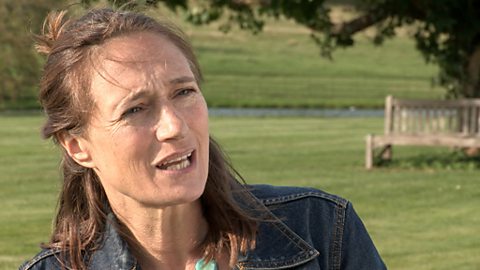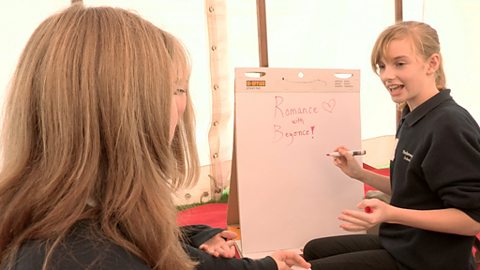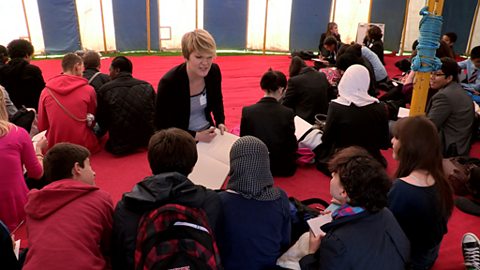MICHEAL MORPURGO:I write most of my stories in the first person
MICHEAL MORPURGO:and I put myself centre stage.
MICHEAL MORPURGO:In almost all the stories that I write sometimes I even call the main character Michael because I can't think of anything else. I'm that pathetic.
MICHEAL MORPURGO:But I do put myself at the heart of a story. Particularly if I have to feel that I'm there for instance I wrote a book called private peaceful.
MICHEAL MORPURGO:I wrote this book because of one thing I came across in a museum. I went to a place called Ypres in Belgium.
MICHEAL MORPURGO:Which is the sight of a terrible battle in the First World War. There's a wonderful museum there called In Flanders Fields I was walking out the museum in tears, because it’s such powerful evocation of futility of war as Wilfred Owen called it.
MICHEAL MORPURGO:So you come out feeling wretched and the last thing I saw was a little letter in aframe on the wall.
MICHEAL MORPURGO:And it said, "Dear Mrs so and so. We regret to inform you that your son, Private so and so with a number, was shot, at dawn, for cowardice on such and such a date, 1916.
MICHEAL MORPURGO:And just above the little letter was an envelope. Ripped open.
MICHEAL MORPURGO:And as I saw the rip… My mind just went straight to the mother. And I can see her standing there. Opening this envelope knowing it was bad news and then discovering not only was her son dead but the manor of his dying. How terrible that must have been.
MICHEAL MORPURGO:And I thought hang on it's not good enough just to feel this. Find out more about it. So I went to the man at the museum and I said "How many soldiers were shot for cowardice in the First World War?"
MICHEAL MORPURGO:And he said "Over 300 and that's just on our side."
MICHEAL MORPURGO:And you just… You just can't imagine a world where that sort of thing happens. I found it shocking and then what I discovered…
MICHEAL MORPURGO:Was that all these years later this country had not pardoned them.
MICHEAL MORPURGO:So I thought write a story about it. How do you write a story about it, I thought. Somehow you have to find the voice that shines the camera if you like. At the story in the most powerful way that you possibly can.
MICHEAL MORPURGO:And in this particular case, what I decided to do was to tell the story from the point of view of one soldier there's two soldiers in my story, brothers.
MICHEAL MORPURGO:And you don’t know in the story which of them is going to get shot. What you do know, is that in he morning at 6 o'clock when it always happened, something terrible is going to happen.
MICHEAL MORPURGO:And your with one of these soldiers and I tell it in the first person.
MICHEAL MORPURGO:I'm going to read you just half a page.
MICHEAL MORPURGO:This was my attempt really to become a seventeen year old young man, writing, speaking in 1916. It begins…
MICHEAL MORPURGO:"Five past ten.
MICHEAL MORPURGO:They've gone now, and I'm alone at last.
MICHEAL MORPURGO:I have the whole night ahead of me
MICHEAL MORPURGO:and I won't waste a single moment of it.
MICHEAL MORPURGO:I shan't sleep it away.
MICHEAL MORPURGO:I won't dream it away either I mustn't
MICHEAL MORPURGO:because every moment of it will be far too precious.
MICHEAL MORPURGO:I want to try to remember everything.
MICHEAL MORPURGO:Just as it was, just as it happened.
MICHEAL MORPURGO:I've had nearly 18 years of yesterdays and tomorrows. And tonight I must remember as many of the as I can, I want tonight to be long.
MICHEAL MORPURGO:As long as my life not filled with fleeting dreams that rush beyond towards dawn.
MICHEAL MORPURGO:Tonight, more than any other night in my life I want to feel alive."
MICHEAL MORPURGO:It's tumbling upon things you know? I mean I was lucky enough, privileged enough to thirty five years ago to meet in my pub at home in Devon.
MICHEAL MORPURGO:A soldier who had been to the First World War, I knew he was an old bloke he was in his eighties by then, and he'd–
MICHEAL MORPURGO:I knew he'd been there but I didn’t know any more about him I hardly knew him really and I sat down and I had half a pint with him. And I just asked him the question I said, "What regiment were you in?" He said,"I was in the Devon Yeomanry."
MICHEAL MORPURGO:And then he said something wonderful which I've never forgotten he said, "I was there with horses."
MICHEAL MORPURGO:I said, "what do you mean with horses?" He said, "Well, Cavalry." And then he started talking and he started talking, and he told me what it was like to be 17, to leave these shores.
MICHEAL MORPURGO:To go across with the Yeomanry. And find himself in this appalling, appalling war.
MICHEAL MORPURGO:How he felt…
MICHEAL MORPURGO:Petrified.
MICHEAL MORPURGO:And how he found comfort in talking to his horse each night when he went to the horse lines to feed it.
MICHEAL MORPURGO:And he would talk to that horse as if it was his best friend because it was his best friend.
MICHEAL MORPURGO:And he meant it. And I thought this is the most extraordinary thing I've ever heard. Someone like this, who talks to a horse.
MICHEAL MORPURGO:And then I thought, I'm not sure anyone has told this story of a horse and maybe if you told it through the horse's mouth you could tell the story not just of the British side or the German side or the French side. But a story of the universal suffering of the First World War.
MICHEAL MORPURGO:You have to forget when you're sitting in front of an empty page, I think, that you are writing.
MICHEAL MORPURGO:What I've discovered is the best way to do it is to do what most kids like doing which is to talk a story.
MICHEAL MORPURGO:You talk it. From your head where the dreamtime has been down your arms through your fingers onto the page.
MICHEAL MORPURGO:And you let it flow which means mistakes and all you don’t worry about the spelling you don’t worry about the punctuation. I'm sorry but you don’t, not the first time you just get the stupid thing down there.
MICHEAL MORPURGO:I think it's rather like an artist sketching, you know? When an artist is sketching it's letting the line flow capturing somehow the image of it. And that’s what I do when I first write, I tell it down onto the page.
MICHEAL MORPURGO:And then craft it afterwards. I think if you're a writer you have to live, a really interesting life.
MICHEAL MORPURGO:You have to talk to people. Listen to people, go places. Read books like crazy. Fiction, non-fiction watch telly, watch movies.
MICHEAL MORPURGO:Simply drink the world into your head. So that you have this huge well, full of the events of your life.
Video summary
Before an audience of 400 young people, best-selling author Michael Morpurgo reveals some of the techniques that shape his writing.
Michael explains the importance to him of writing in the first person, why it is vital to find a story's point of view and voice and why aspiring writers must talk their stories on to the page.
He describes how he came to write the novels War Horse and Private Peaceful and reads from the latter, a powerful novel inspired by the execution for cowardice of more than 300 British soldiers during World War I.
This clip is from the series How to Write.
Teacher Notes
Can be used to show students the importance of researching before starting any creative writing.
Students are set the task of making a visit to somewhere they have never been before, for example; a museum, historical place, library, unusual shop or interviewing a family member about something from their lives, which they knew very little about before this time.
Students can record photos and conversations on mobile phones or jotters.
Students can bring these into the classroom to form the basis for inspiration for new stories.
Can students use some of the narrative techniques which Michael Morpurgo outlines, to help them begin to fill the blank page?
This clip is relevant for teaching English Literature at KS3 in England, Wales and Northern Ireland, and 3rd and 4th Level in Scotland.
Rebecca Abrams - writing tips. video
Rebecca Abrams gives top tips for young fiction writers on different subjects.

A fictional short story writing workshop. video
Rebecca Abrams and Charles Cummins lead a fiction writing workshop that begins with a group of teenagers writing about personal memories of holidays.

Poetry workshop about happiness. video
Caroline Bird invites young people to write a poem as a team.
